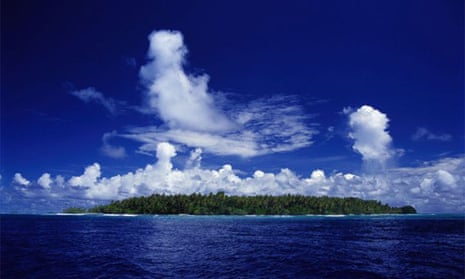Australia risks going “backwards” on climate change, straining relations with small Pacific island states that are being hit by unusually powerful storms, floods, droughts and massive tides, according to the foreign minister of the Marshall Islands.
“Australia has always been our friend but the change in their government last year has resulted in problems,” said Tony de Brum on a visit to London to address British and other countries’ economic and political leaders about the physical plight that Pacific states such as the Marshall Islands find themselves in.
“We are having difficulty understanding Australia’s climate change policies and their new environmental regime. We don’t understand what they are thinking. We worry that the change in their policy may result in movement backwards.”
Australia’s Coalition government is trying to repeal carbon pricing in favour of a grants system for businesses to lower their emissions. Repeated independent analysis has shown its Direct Action plan is unlikely to achieve its target of a 5% cut on emissions by 2020, based on 2000 levels.
The Coalition has also set about abolishing climate change agencies, slashed staff numbers at the Department of the Environment and declined to send a minister to international climate talks.
Small island states around the Pacific are sending Australia the same message about climate change, according to De Brum.
“Australia has always been generous,” he said. “But it is as if our big brother doesn't understand us. The same message is going to Australia from other countries in the Pacific forum. Little brother is saying, ‘Big brother should get up and smell the flowers.’ ”
Scattered across 2m square kilometres of ocean, the Marshalls have all experienced extremes linked to climate change in the past year, he said. “We have had major drought in the north, floods in the south, seawater intrusion of groundwater, and thousands of people displaced by a king tide. That is the reality. What does Australia not understand?”
Pacific states including Kiribati, Tuvalu and the Marshalls are suffering at the present level of emissions, he said, making the prospect of future sea level rises and more powerful cyclones frightening.
“Some islands and atolls are already disappearing. One, called Enebok … is now underwater. Yet 20 years ago it had coconut palms and houses. At the moment we are [able to move] people around the islands. But any prudent leader would always have evacuation at the back of their mind.”
Climate change and the lack of cash to invest in renewable energy technologies, such as ocean thermal energy conversion, is now putting a brake on development, he said.
"We are spending 30% of our income on petroleum products like diesel and jet fuel. We live by exporting fish, but we cannot add value to our raw produce because we lack energy and water. It spooks possible investors who say, ‘Why should we invest in a country that cannot provide affordable water and power?' "
De Brum, who represents the atoll of Kwajalein, known for its large US missile base, last week announced that the Marshalls would sue nine nuclear weapons countries, including Britain, at the international court of justice in The Hague for not complying with their disarmament obligations.
The islands were the scene of US nuclear tests in the 1950s. One, in 1954, involved the detonation of a 15 megaton hydrogen bomb on Bikini atoll, producing an intense fireball followed by a 20-mile-high mushroom cloud and widespread radioactive fallout. The Marshalls government says the blast was 1,000 times more powerful than that at Hiroshima.
“Our people have suffered the catastrophic and irreparable damage of these weapons, and we vow to fight so that no one else on earth will ever again experience these atrocities,” de Brum said.
De Brum met Britain’s junior Foreign Office minister Hugo Swire in London, as well as former the chief scientist David King and Felipe Calderón, the former Mexican president and now chair of the Global Commission on the Economy and Climate who is writing a major followup to the Stern report. Later this year he will go to Washington to meet the US secretary of state, John Kerry.
“It is important that we talk to the powers,” he said. “We are small. We fear our voice gets lost. We know we are knocking at a very hard wall.”

Comments (…)
Sign in or create your Guardian account to join the discussion